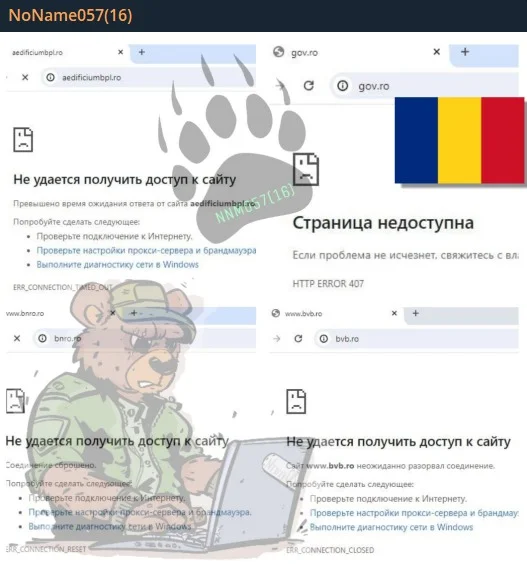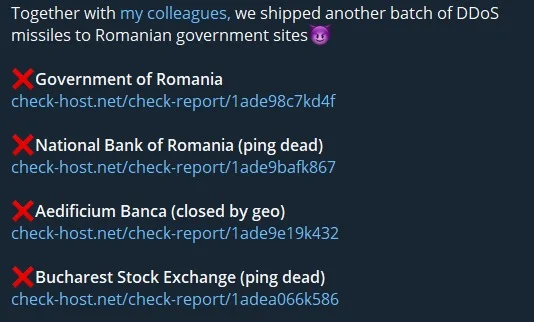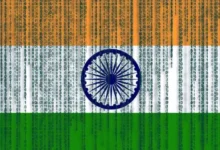Romania Cyberattack: Pro-Russian Hackers Target Govt Sites

Pro-Russia hackers target Romania in DDoS attack. Government, stock exchange and bank websites down.
Krishna Murthy June 18th, 2024

Share on LinkedInShare on Twitter
Several pro-Russia hacker groups have allegedly carried out a massive Distributed Denial-of-Service (DDoS) attack in Romania on June 18, 2024. The Romania Cyberattack has affected critical websites, including the official site of Romania and portals of the country’s stock exchange and financial institutions.
The attack was allegedly conducted by NoName in collaboration with the Russian Cyber Army, HackNet, and CyberDragon and Terminus. The extent of the damage, however, remains unclear.

Details About Romania Cyberattack
According to NoName, the cyberattack was carried out on Romania for its pro-Ukraine stance in the Russia-Ukraine war. In its post on X, NoName claimed, “Together with colleagues shipped another batch of DDoS missiles to Romanian government websites.” The threat actor claimed to have attacked the following websites:
- The Government of Romania: This is not the first time that the country’s official site was hacked. In 2022, Pro-Russia hacker group Killnet claimed to have carried out cyberattacks on websites of the government and Defense Ministry. However, at that time, the Romania Government claimed that there was no compromise of data due to the attack and the websites were soon restored.
- National Bank of Romania: The National Bank of Romania is the central bank of Romania and was established in April 1880. Its headquarters are in the capital city of Bucharest.
- Aedificium Bank for Housing: A banking firm that provides residential lending, home loans, savings, and financing services. It was founded in 2004 and has branches in the European Union (EU), and Europe, Middle East, and Africa (EMEA).
- Bucharest Stock Exchange: The Bucharest Stock Exchange is the stock exchange of Romania located in Bucharest. As of 2023, there were 85 companies listed on the BVB.

Despite the bold claims made by the NoName group, the extent of the Romania cyberattack, details of compromised data, or the motive behind the attack remain undisclosed. A visual examination of the affected organizations’ websites shows that all the listed websites are experiencing accessibility issues. These issues range from “403 Forbidden” errors to prolonged loading times, indicating a probable disruption or compromise.
The situation is dynamic and continues to unravel. It is imperative to approach this information cautiously, as unverified claims in the cybersecurity world are not uncommon.
The alleged NoName attack highlights the persistent threat of cyberattacks on critical entities, such as government organizations and financial institutions.
However, official statements from the targeted organizations have yet to be released, leaving room for skepticism regarding the severity and authenticity of the Romania cyberattack claim.
Until official communication is provided by the affected organizations, the true nature and impact of the alleged NoName attack remain uncertain.
Romania Cyberattacks Are Not Uncommon
This isn’t the first instance of NoName targeting organizations in Romania. In March this year, NoName attacked the Ministry of Internal Affairs, The Service of Special Communications, and the Central Government.
In February, Over a hundred Romanian healthcare facilities were affected by a ransomware attack by an unknown hacker, with some doctors forced to resort to pen and paper.
How to Mitigate NoName DDoS attacks
Mitigation against NoName’s DDoS attacks require prolonged cloud protection tools and specialized software and filtering tools to detect the flow of traffic before it can hit the servers. In some cases, certain antivirus software can be successful in detecting threats that can be used by organizations to launch DDoS attacks.
A robust and essential cyber hygiene practice to avoid threats includes patching vulnerabilities and not opening phishing emails that are specially crafted to look like urgent communications from legitimate government organizations and other spoofed entities.





